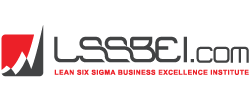Overview – Organisational Excellence
What is Organisational or Business Excellence?
Business Excellence refers to a holistic model for guiding the management of an organisation to deliver Balanced Sustainable Performance comparable to the best in the field. The model stems primarily from the work of Dr Edwards Deming and encourages the application of key principles, practices and tools on key organisational systems.
The Influence of Edwards Deming
Deming in his writing and teaching focused on the idea of quality involving delivering what the market wanted at a price they would pay but in a dependable and reliable way.
- This implied acquiring a deep understanding of what a market (customer) needed and then designing the value stream to deliver the desired experience. Doing this in a reliable, dependable and efficient way would place any organisation in a very strong competitive and sustainable position.
- This approach raised issues about reducing waste. Deming outlined a chain reaction where reducing waste and rework would improve productivity, increase value added work, reduce non value add work (wasteful and slow practices) and so reduce costs and improve quality – win more of the market etc.
- Given the many external and internal factors that affect work in a Value Stream it’s not surprising that there are always gaps between the ideal and actual operation. Improving the organisation by learning why things are happening and then making changes that are a measurable improvement to close the gaps is a key aspect of Deming’s approach. Again any organisations that can identify their strategic and operational priorities for improvement and carries them out are likely to sustain high levels of performance.
- In Post-war Japan, Deming and Juran worked with the country’s industrial leaders (including the Japanese Union of Scientists and Engineers) to apply their principles to the reconstruction work going on in Japan.
- The success of Japan Post WW2 led people around the world to pay attention to Deming’s ideas. He conducted seminars around the world through the 80′s onwards and consulted to many organisations and governments receiving many awards. He is considered the original management consultant!
- His work was interpreted and absorbed into the many Organisational Excellence Frameworks around the world like the Australian, Baldridge and European Frameworks. Many countries have Excellence Awards based on his ideas.
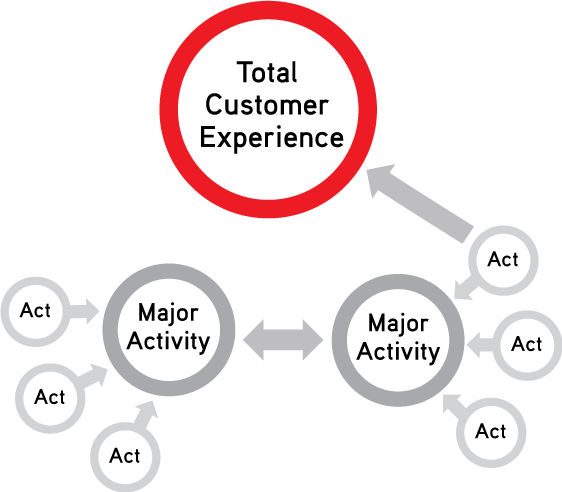
Design and Execute Value Streams for Target Markets
To increase the chances of delivering a value proposition that is both superior and profitable, it becomes important for a leadership team to Define market segments in terms of the most important experiences / benefits / value the market desires and upon which many subsequent choices and design decisions are made.
For “Experiences” to be strategically actionable for a business, it must be defined and understood at a specific and precisely measurable enough level of detail to allow integration around it by all elements of the organisation. Processes must perform in particular ways in conjunction with one another. Process Measures are set to monitor performance to design.
So Leadership must design, manage, measure and improve the value chain so that all systems / processes reinforce one another to predictably deliver the experiences.
Having chosen to deliver to a market a specific set of experiences ( a Value Proposition), an experience focused organisation then sees to it that the organisation’s single-minded agenda is in fact to deliver the proposition better than the competition at a low enough cost to allow an adequate return.
For “Experiences” to be strategically actionable for a business, it must be defined and understood at a specific and precisely measurable enough level of detail to allow integration around it by all elements of the organisation. Processes must perform in particular ways in conjunction with one another. Process Measures are set to monitor performance to design.
So Leadership must design, manage, measure and improve the value chain so that all systems / processes reinforce one another to predictably deliver the experiences.
The organisation monitors with great discipline the actual delivery and its consequences. Thus any business is a system delivering some value. An experience based / market based organisation is integrated around delivery of a specific value propositions – a value delivery system.
The philosophy has been applied worldwide and many countries have adapted the ideas into Excellence Frameworks like the Baldridge in the US and the European Framework. Australia has its own Business Excellence Framework. The model shown below draws on the themes from various Excellence Frameworks from around the world.
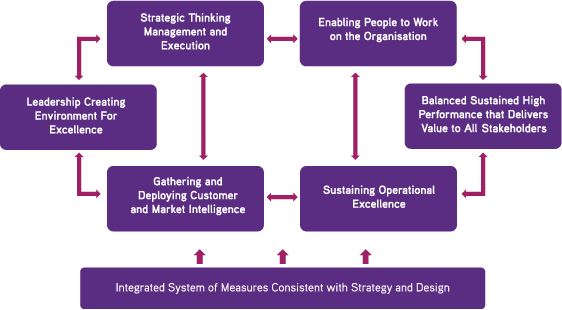
The model shown provides a view of the major elements of the Organisational or Business Excellence Frameworks. The drivers of Excellence are seen as the areas of Leadership and Customer Focus. Strategy, Information and People are seen as enablers of Excellence. Processes are the core by which Excellence is created finally delivering high levels of performance against a balanced set of indicators. Each of these areas is broken down into key performance systems within an organisation. These vary across the frameworks of the world. However, there is great consistency in models used.
The model is based on the practice of key principles (such as Outside In Thinking, Systems Thinking, Statistical Thinking) within these areas of an organisation.
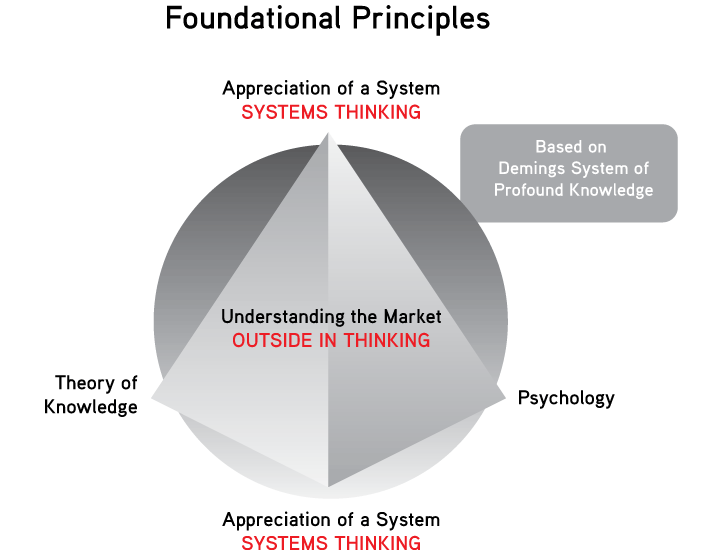
In particular, the approach encourages continual learning and improvement by applying a form of thinking, planning and assessment to each aspect of an organisation.
In Australia, the four elements of Approach-Deployment-Results-Improvement have been used to great effect.
- What is the planned approach used in this system or aspect of the organisation? How does it compare to best practice?
- Has it been deployed or implemented?
- What results are being achieved? Sustained? Best Practice?
- What has been learnt and so what improvements have been made?
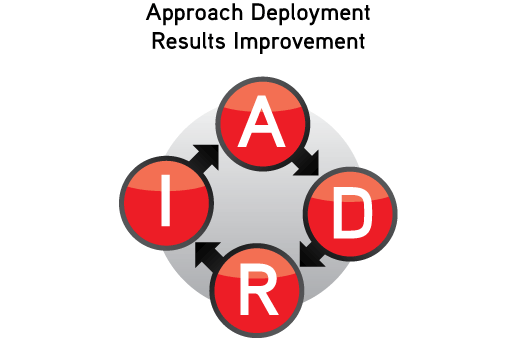
In the US Approach-Deployment-Learning-Integration and Results have been used.
In Europe the 4 elements are: Results, Approach, Deployment, Assessment and Review are used.
Examining critical areas of the organisation using such a framework helps identify key areas for improvement as well as the kinds of actions to take.
Key Benefits
- High levels of results sustained over time
- Improved Leadership practices and systems to drive change for improvement
- Increased levels of Stakeholder / Customer Loyalty and Satisfaction
- Improved Operational Efficiencies and maturity in managing core Value Streams
- Enhanced employee satisfaction and well being
Business Excellence Courses and Consulting Services
The Institute provides courses and services designed to support organisations develop internal capability to practice the Business Excellence philosophy and achieve measurable improvement through clever solutions. All courses and services can be adapted to suit different needs of organisations. More detailed information can be found on the website.
